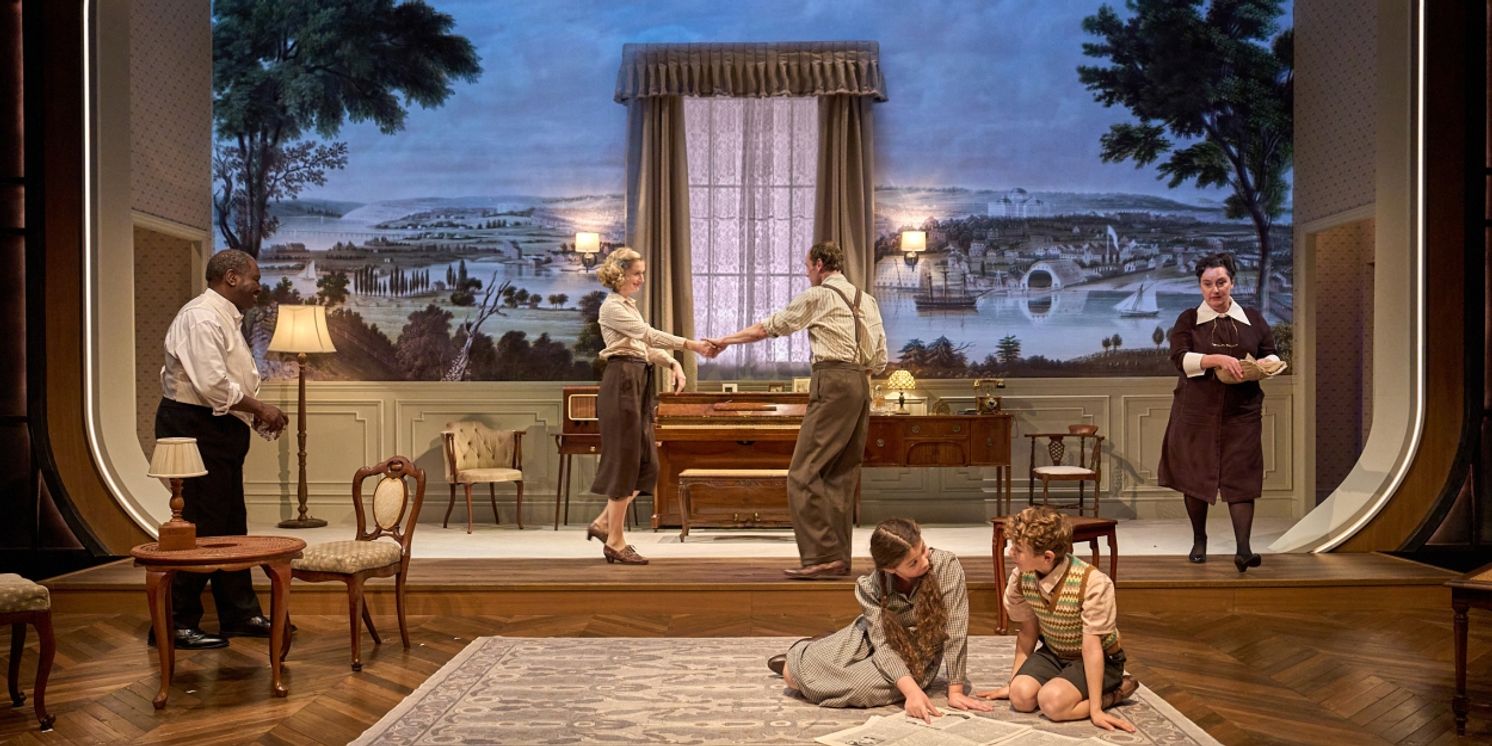Review: WATCH ON THE RHINE, Donmar Warehouse
Lillian Hellman’s 1941 play is a time capsule of American non-interventionism under the guise of a comedy of manners that suddenly becomes a thriller.

![]() Fanny Farrelly is anxiously awaiting the arrival of her daughter Sara and her family, who's been living in Germany for the past 20 years with her husband Kurt and their three children. It's the spring of 1940, Kurt has been very active in anti-Fascist circles, and Sara wants a safer environment for her kids. Meanwhile, the Farrellys have been hosting Teck, an exiled Romanian count, and his American wife. Lillian Hellman's play is a time capsule of American non-interventionism under the guise of a comedy of manners that suddenly becomes a historical thriller.
Fanny Farrelly is anxiously awaiting the arrival of her daughter Sara and her family, who's been living in Germany for the past 20 years with her husband Kurt and their three children. It's the spring of 1940, Kurt has been very active in anti-Fascist circles, and Sara wants a safer environment for her kids. Meanwhile, the Farrellys have been hosting Teck, an exiled Romanian count, and his American wife. Lillian Hellman's play is a time capsule of American non-interventionism under the guise of a comedy of manners that suddenly becomes a historical thriller.
The whimsical differences in lifestyle inexorably transmute into a sharp commentary and instigate a call to action for a nation that had not yet entered the conflict when the show premiered on Broadway in 1941. It's a bold, uncompromising move for Ellen McDougall to stage it in the face of the Ukrainian war and the perfect opportunity to prove why the Donmar didn't deserve the 100% cut to its Arts Council England funding.
The former artistic director of The Gate Theatre sits the production between documentary and fictional biopic by framing the action with an old-timey tv screen. Classic cinema titles bookend it, contextualising the political climate. They give further background at the end in the form of a postscript that enlightens the public on the inspirations behind the characters and Hellman's own activism.
While this styling might be a reference to the more famous iteration of the story, the 1943 Hollywood film starring Bette Davis, it's worth noting that filmed footage is also the only visual source that most of us have ever had of the war. It's a clever dramatic choice. The details continue in the parallels of the two groups and the contrast of manners of speaking as well as textiles.
Where Fanny and her household are clothed in sleek and ironed vibrant fabrics, Sara's brood wear rough neutrals that have been mended over and over again. Basia Bińkowska's meticulous design is truly impressive. This is not only a clash of cultures, but it also speaks of the intrinsic effect of the Nazi regime compared to American wealth that has never known war or poverty.
The children (Finley Glasgow, Tamar Laniado, Henry Hunt on the night), well-spoken and wise beyond their years, marvel at being given a choice of breakfast and a bath. Where the older Farrellys are good-natured and perhaps a bit naïve, the Muller kids are astonishingly quick and acute while their mother struggles to slip back into her former life and her husband remains on his guard.
Patricia Hodge's Fanny is the heartbeat of the piece. Unfiltered and thoroughly entertaining, her character - and her maid Anise (Kate Duchêne) - is where Hellman's writing has the chance to properly entertain and lean into the drawing-room quality of the comedy even when it turns sour in the second act. The political commentary creeps in stealthily, and the unsuspecting tale suddenly becomes an intense thriller at the hand of John Light's Teck, a Nazi sympathiser desperate to regain his title.
His steely gaze constantly follows Mark Waschke's Kurt. The fallen aristocrat's eyes shoot arrows at the anti-Fascist, testing his identity and constantly squint in his direction. Light is scheming and controlling in every aspect of his being, starting from his marriage with his wife Marthe (Carlyss Peer) to his dodgy relationships with confirmed Nazis. He is in direct opposition to Waschke and Caitlin Fitzgerald's Sara. Their loyalty to one another is as foreign to the others as their devotion to the cause.
Lighting and sound design (Azusa Ono and Tingying Dong respectively) heighten the atmosphere and nudge the public's emotional response creating tension. Ultimately, at the core of the play lies a precise reflection on how family relates to the dichotomy of good and evil. Mostly, it's a call to arms to abandon apathy in order to create a safer world.
Watch on the Rhine runs at The Donmar Warehouse until 4 February.
Photo Credit: Manuel Harlan
Reader Reviews
Powered by
|
Videos

